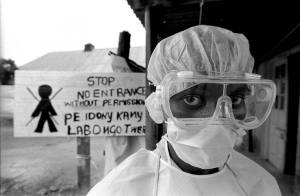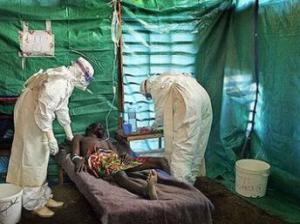Today volunteers in Guinea, Sierra Leone, and Liberia received the information that we will be sent home for an undetermined amount of time as a cautionary move against the rising risk of Ebola.
Friends and family back home are overjoyed at the news, but volunteers in-country are stumbling around in a state of shock. Projects that have taken months of sweet-talking the authorities, grueling grant applications, planning every step of the way have to be left now – postponed indefinitely. Bags must be packed. Close of Service dates for volunteers preparing to leave will be moved up. Pre-service training has been stopped dead in its tracks for the recently arrived group of volunteers. Somehow, we must all find the words to explain to our friends and host-families the harsh truth that we are leaving and don’t know when we will be back.
The Ebola outbreak began in the Forest Region of Guinea in February 2014 and was quite a shock. The word “ebola” conjured up images of bleeding, vomiting, dying and astronaut-style HAZMAT suits.
But, looking around my village I saw that nothing had changed. Ebola was here now, but it seemed too far away to be dangerous to me and my village. It was more likely, and still is, that people in Guinea would die of malaria or malnutrition than a deadly viral hemorrhagic fever. I remember calling my mother to dispel her fears. She’s a reasonable woman but even she imagined that I was living through some sort of ‘zombie apocalypse’ with infected patients roaming the streets looking to pass on their contagion.
“No, Mom. I’m OK. Everything will be fine as long as I don’t touch dead bodies and stay away from severely ill people, which I tend to do anyways.”
Over the course of the past five months, Peace Corps Medical Officers (PCMO’s) have taught us how the disease is spread, instructed us to avoid ill people and funerals, and placed a ban on working in local health centers. Once Ebola became a daily used word in my Peace Corps vocabulary, the initial shock wore off and I spent more time dealing with worrying friends and family members back home than worrying about my own health and safety. I’ve been carefully following the outbreak, receiving updates from PCMO’s on new confirmed and suspected cases, and have felt safe the entire time. Other more anxious volunteers posed the question lurking in the back of all of our minds – “Could we be sent home for this?” I always assumed that the answer was a resounding NO. Day to day life at my site has hardly been affected, save for new radio spots educating the public on how to avoid contracting the virus and the occasional news report that more cases have been confirmed. I’ve taken every opportunity to educate people in my village about the seriousness of the illness and how to minimize risk of contracting it, but as time has gone on so has life and the outbreak seemed more and more distant to us in Koba.

But it has lurked, continued, spread, and grown. As of today, 1,201 cases have been confirmed in Guinea, Sierra Leone, and Liberia and 672 of those patients have died. That’s a 56% mortality rate. Still, living through this Ebola outbreak has proven to be less scary than it must be for all those back home in the States, being bombarded these types of headlines daily:
“The Curse of Ebola”
“Ebola Outbreak: Could it spread to the US?”
“Death Toll Rises In ‘Totally Out Of Control’ Ebola Outbreak”
Unfortunately, this outbreak has been severely mismanaged on two ends. Primarily, the Guinean government is not equipped to handle it but more tragically the Western world has chosen to feed the fire with sensationalized media instead of what we really need here in Guinea, Sierra Leone and Liberia – medical assistance, man-power, education, and funding. In a recent New York Times piece Ken Isaacs, the Vice President of Programs and Government Relations for international relief organization Samaritan’s Purse, penned a plea to the world to wake up to what’s happening in West Africa:
“Doctors Without Borders is the only non-governmental organization working against Ebola in Sierra Leone and Guinea. The organization I work for, Samaritan’s Purse, has collaborated with the group in Liberia, but this outbreak is too much for us to take on by ourselves. We desperately need others to join this fight…. I call on the international community and the donor governments of the world, particularly in Europe and the United States, to step in and recognize the very limited capacities of the ministries of health in West Africa and to help them contain this disease. I urge all organizations with capacity in medical, public health, social mobilization and water/sanitation to help in this fight. A disaster has descended upon West Africa, and it deserves the full attention of the international community. The world’s deadliest and most contagious disease is on a collision course with millions in major population centers. The situation is urgent. There is no time to wait.”
I’m devastated to be leaving. Truthfully, it hasn’t yet hit me. How does one face their family — because that is what my community has become — and tell them that I must leave while they must stay? It is another example of the astounding privilege I have as an American, and perhaps the heaviest blow of them all. I am not any better than these people; I have simply been more blessed in the game of chance we call life. I get to leave while they must stay. My country has decided the risk is worth removing me — but who will be their hero? Who will help Guinea? Sierra Leone? Liberia?
To those outside the affected nations, Ebola is a headline; a scary word, a panicked nightmare that some African may hop on a plane and land on your doorstep with his deadly illness. But these are real people affected and they are scared. The Ebola outbreak in West Africa is not growing due to a super-mutation of the virus — it is spreading due to misinformation, fear, and hard-to-change cultural traditions. Doctors working to contain the virus have met serious distrust and even conflict in Guinea, Sierra Leone and Liberia, which has been negatively reported in Western media as superstitious and religiously based. But as Susan Rered of Salon writes,
Distrust of Western medicine may have less to do with superstition than with history: forced sterilizations in Peru; the intentional infection of Guatemalans with gonorrhea and syphilis; marketing campaigns urging mothers in countries lacking safe water supplies to replace breastfeeding with infant formula so that women could work in western-owned factories; the sale in Africa of pharmaceuticals that passed their expiration date for sale in the West; the harvesting of organs in India for transplants to wealthy foreigners.
Yet many continue to blame the disease on Africans who have rejected foreign aid. Rered notes that people have been quick to judge West African citizens and government, thinking that this type of outbreak would not be possible in America. But there are deep-rooted causes contributing to the current situation:
Attention to sorcery rather than the inequalities of globalization obscures the fact that the biggest leaps in life expectancy in the U.S. and Europe came about because of massive government-funded public health measures — sewage systems and clean water supplies – not because we gave up our religious beliefs.
The misinformation, distrust, and lack of education is unfortunate and causing this virus to spread, but it is not the fault of the Guinean people. The rich history of Guinea is pained by colonization, civil discord, military raids, failed communism and struggling democracy and has led to a general distrust of both the Guinean government and the Western world in general. The education system, 70% unemployment rate, and social structure sets people up for failure; there is nothing inherently unintelligent or incapable about Guineans. During my time here I have been constantly amazed at the rich linguistic intelligence I see on a daily basis — people are often fluent in 5 or 6 languages, while Americans struggle through their required 4 years of Spanish or French. Creative solutions and a tenacious energy run freely through villages and cities. Yet I fear that many back home reading about this outbreak imagine an uneducated country with religious zealots refusing to be treated. I imagine that these people cluck their tongues, sigh, and silently think that this would never happen in America. And they go back to their day without a second thought.
As always The Onion, a satire news organization, has hit the nail on it’s odd little head with a recent piece entitled “Experts: Ebola Vaccine At Least 50 White People Away” with a fictional doctor stating that “waiting more than 50 white people for an effective preventative measure was something the world would simply not allow.” As I am now forced to leave, I worry about the world allowing this outbreak to continue and leaving Guinea behind. Leaving West Africa behind.
Now is a time for action. We must step up, we must help. We must contain this outbreak. More doctors are needed. More equipment is needed. More education is needed. More government support and action is needed. We can start by contributing to Doctor’s Without Borders (click to donate) and by remembering that real people are involved, who are very uneducated and scared, and remembering that we also need to educate ourselves before we jump to immediate panicked conclusions and assume that the fault lies at the hands of those suffering from this illness.
I leave you all with this quote from an oustanding article from The Independent I recommend you all read:
Perhaps our obsession with the horrors of Ebola says more about us than anything else. That it kills so rarely, and, for many of us, so far away makes it more nightmarish to contemplate. Absolutely horrific, sure, and yet, could you really argue that stage IV metastatic cancer is any less gruesome? Fearing Ebola is morbid escapism, a way to flirt with the inevitability of our own demise, to ponder the frailty of our own ineffectual meat sacks. Ebola is our macabre fantasy not because it’s likely, but because it isn’t. To many in the West, Ebola matters not because of what it does and how it kills; it matters because of what it represents.
My prayers are with all Guineans, Sierra Leonians, and Liberians. May God help these people and grant a quick end to this devastating outbreak. Please keep them in your prayers and thoughts.
My heart is with the village of Koba and will remain there until I can safely return.
Updates to follow as they come.






Reblogged this on Viața Mea: Cu Capul în Nori.
i was working on a USAID project in egypt when i was evacuated. your piece resonates so much with me–especially the part of getting on a plane and leaving all those i cared so much about to a scary and unsure world. i don’t think i’ve still recovered from that–and it’s been almost 3 1/2 years since i was evacuated. excellent piece. and may YOU find PEACE soon–i needed help to work through my guilt i walked away. you may do. get that help and then get out and fight for what we all know is very very unjust world.
Thank you Diane for the kind and honest advice. Best wishes to you, Sara
Reblogged this on Channess and commented:
Well put….
Excellently-written article Sara, I’m sorry you & your co-volunteers have had to be uprooted but I’m also glad to see Peace Corps taking the safety & security of its Volunteers very seriously. Hoping for an end to the epidemic soon, very soon, for all those affected. Kristi, RPCV Burkina Faso 1999-2001
Thank you for so candidly sharing your story with us. I think that most people perceive the Peace Corps and other programs like it solely as a means to serve people abroad. As your post so elegantly demonstrates, it’s just as much about educating Americans and others about the realities faced by developing nations and the past and present influence of Western powers on those nations. It’s discouraging but unsurprising that this public health crisis has been egregiously misunderstood and distorted in the West. You’ve exposed that in such a poignant way, along with widespread ignorance about the experiences and emotions of volunteers in Western Africa.
Best of luck to you and the people you serve.
Reblogged this on elitecompass and commented:
Ebola horror and humanity ignorance
Pingback: On Being Evacuated: It’s every volunteer’s worst nightmare | Dominoes
Reblogged this on O MUNDO, HOJE….
Pingback: I was saved from Africa's Ebola outbreak, but who will save Africa? - Today.com - Computer Repair Guy Orange County CA
Thanks for the well written information. I was a PCV in Liberia and was evacuated in 1990 during the civil war. I experienced similar feelings of privilege and loss. It was really tough. The war was so devastating. Liberia has been through so much. The rest of the world needs to step up and offer some more support.
Reblogged this on The HealthyCross and commented:
Thanks for sharing.
This will help educate many.
Be safe and prayerful.
Thanks for what you all do!
So sorry you have to leave, but hopefully you’ll be back soon enough. Do you work as a nurse back home? I live in Atlanta not to fat from where they took the patients here.
Reblogged this on kristabella's patch and commented:
I love how well this blogger conveys the need for education and medecine to combat ebola.
Beautifully written…. reblogged this on kristabellapatch
Pingback: Shared from WordPress | IAMBWF
Reblogged this on IAMBWF and commented:
Poignant thoughts from someone on the inside.
Reblogged this on Saludos al Sol.
Outstanding account; it’s a shame the news outlets which picked up your story put the title on it that they did.
Best of luck to you.
Paul, RPCV, Albania, 2007-2009
Agreed and thank you very much.
Reblogged this on An Average Girl's Blog.
Reblogged this on suzannepascuzzo.
Thank you for this post and your work in helping those in need.
Reblogged this on Dear Beloveds and commented:
Please read this, and re-blog at also…
Take care out there and have faith
Reblogged this on rainteach and commented:
Formidable challenge to science and culture. thank you for this informative post.
Reblogged this on amber amulets and commented:
An amazing account of the real truth from someone on the ground, on the front lines, doing what really matters in West Africa. Americans need to wake up and be informed before shunning the problem as someone else’s. I hope they get the assistance they need to contain and end this deadly disease!
More people need to understand the real story. Thank you for telling it!
Reblogged on amberamulets . WordPress . com
Stay positive and keep up the good work.
Reblogged this on Ratunadesky.
Reblogged this on Shmamaland and commented:
I rarely repost, but this is an smart and honest take on the Ebola Epidemic in West Africa. Worth the read.
Reblogged this on annie21livinginusa and commented:
This brings home the scary situation in Africa at the moment…
Reblogged this on corysthoughts.
Reblogged this on claudioelgallo.
A great post and one that genuinely educates people on the problem surrounding ebola
What an insightful piece on the outbreak in your region! I hope that you’ll be able to go back to Guinea in the near future to reunite with your host community.
P.S. Congrats on being selected as a Blog It Home Winner – your posts are amazing!
Beautiful post. Thank you for sharing such a valuable perspective on this. I am sending you best wishes for a safe trip home, and a quick return to your beautiful African community.
Thank you Lauren!
Pingback: On Being Evacuated: It’s every volunteer’s worst nightmare. | bnbdistributions
Pingback: Ebola and the West | There and Here and Back Again
Pingback: On Our Radar: August 15, 2014 | Mid-Atlantic Peace Corps Volunteers
Your heart, soul, and mind are all in a place where many will never be, to serve humanity. I pray they will be reconciled again with your passion.
Pingback: Critical Media Literacy | science in the city
Thank you for putting things in perspective.
Reblogged this on onemillionhouseholds.
Thank you so much for sharing your experience – what a beautifully written account. While I was serving in Ghana, the coup occurred in Côte d’Ivoire & the volunteers & trainees were evacuated to Ghana. Such an uncertain time! I’ll be thinking of you & hoping you can return to your community soon!
-RPCV Ghana 02-04
Pingback: The “Blog It Home” Experience | Sponge and Slate
This is an amazingly insightful article. My prayers are with your host village and I hope you’ll get to go back soon.
Pingback: Im(Press)ive! Your Year in Review — WordPress.com News
Pingback: Im(Press)ive! Your Year in Review | Ingresos Online
Pingback: Im(Press)ive! Your Year in Review | The Digital Past
Pingback: Im(Press)ive! Your Year in Review | NZ